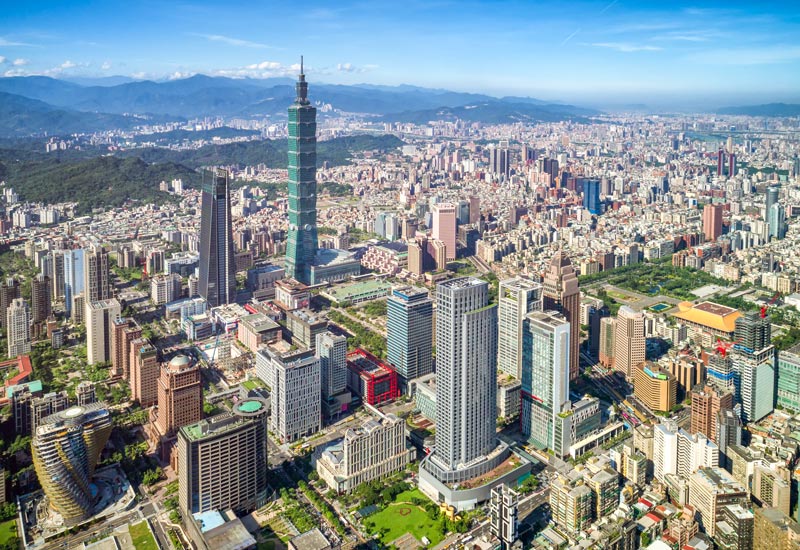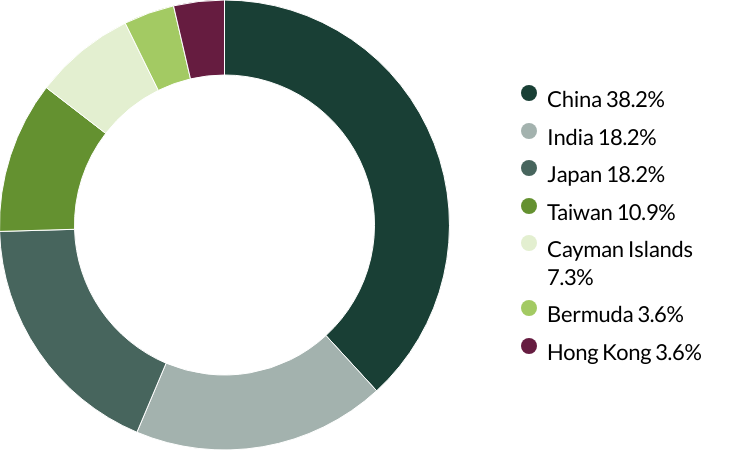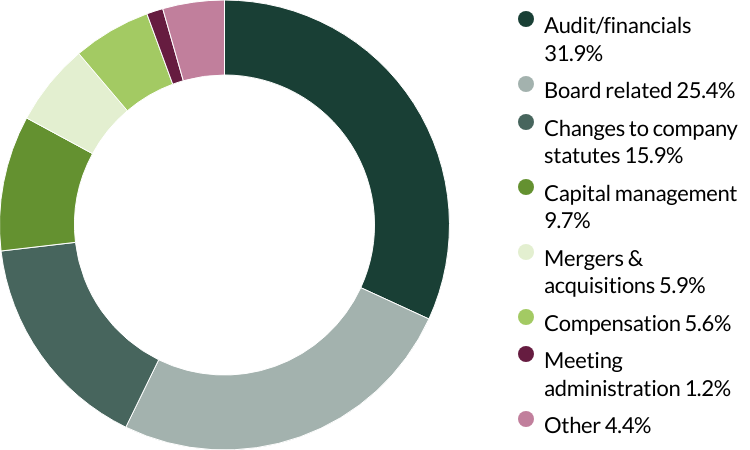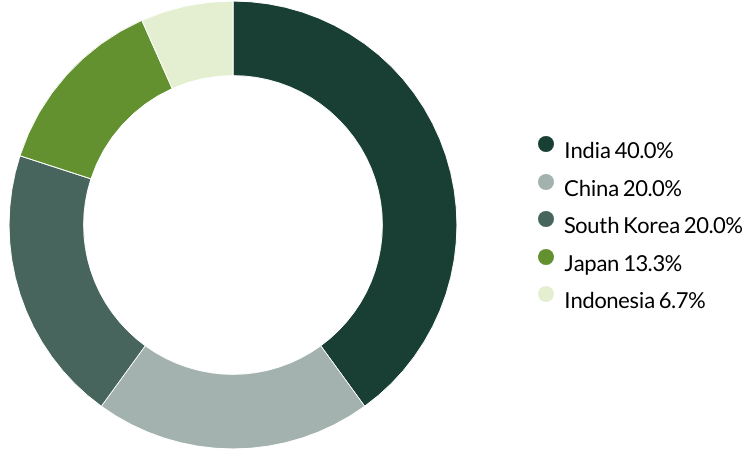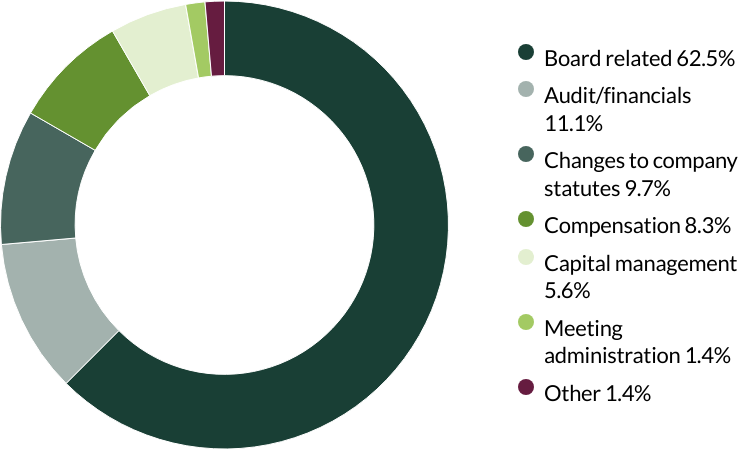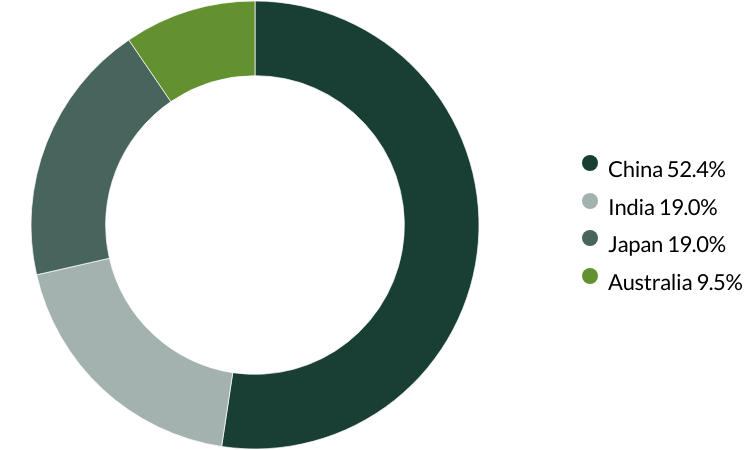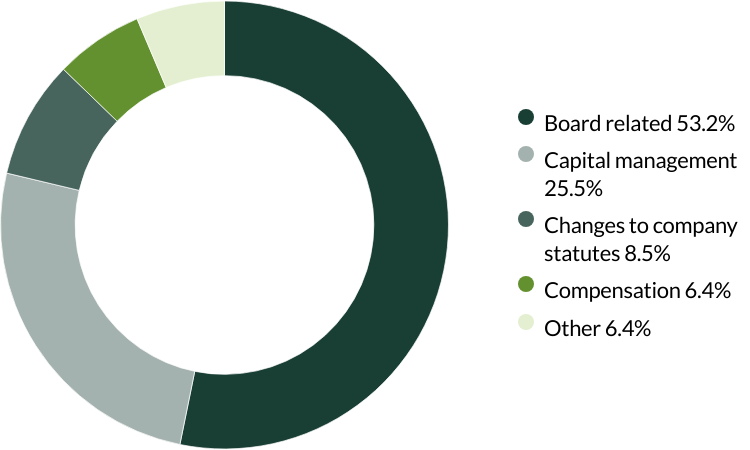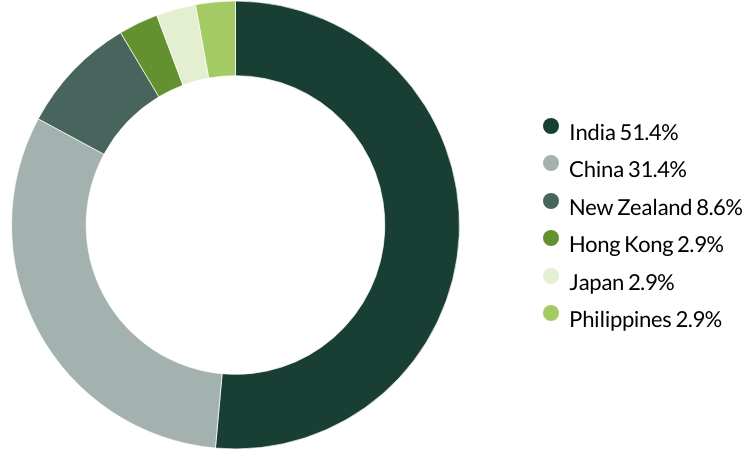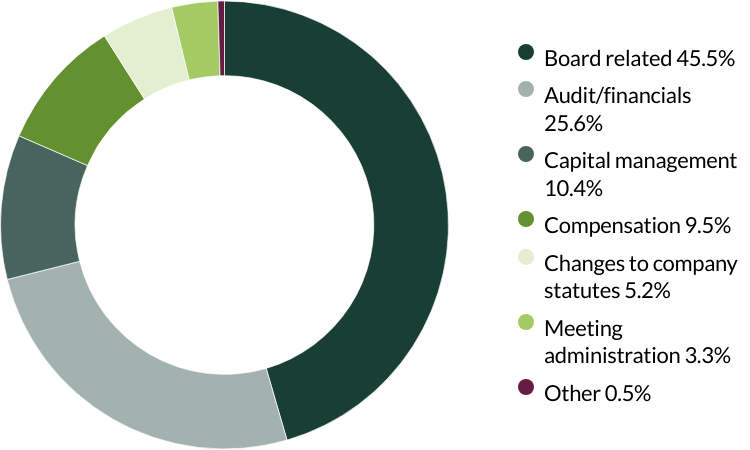Get the right experience for you. Please select your location and investor type.

Asia Pacific and Japan All Cap
The strategy was launched in June 1988, and since September 2019 has been a dedicated sustainability strategy.
The strategy was launched in June 1988, and since September 2019 has been a dedicated sustainability strategy. This equity-only strategy aims to achieve long-term capital growth by investing in a portfolio of between 30-60 companies in the Asia Pacific region, including Japan, that are helping to bring about a more sustainable future.
The ability to invest directly in Japan allows clients to own high-quality Japanese companies far earlier in their Asian growth journeys, as well as accessing a greater pool of domestic companies with attractive growth opportunities that are positioned to contribute to, and benefit from, sustainable development.
Strategy highlights: a focus on quality and sustainability
- Companies must contribute to sustainable development. Portfolio Explorer >
- We invest in high-quality companies with exceptional cultures, strong franchises and resilient financials. How we pick companies >
- We avoid companies linked to harmful activities and engage and vote for positive change. Our position on harmful products >
- Our approach is long-term, bottom-up, high conviction and benchmark agnostic
- We focus on capital preservation as well as capital growth – we define risk as the permanent loss of client capital
Latest insights
Quarterly updates
Strategy update: Q2 2025
Asia Pacific and Japan All Cap strategy update: 1 April - 30 June 2025
Shortly after the quarter began, President Trump announced his ‘Liberation Day’ tariffs. With China responding in kind, the prospect of a sharp contraction in global trade saw markets worldwide – including those in Asia – falling sharply.
Within a matter of days, however, a fall in the US dollar and the threat of a rout in the US government bond market encouraged the president to impose a 90-day moratorium on introducing many of his tariffs. As the world pulled back from an outright trade war, Asian markets rallied, with the gains being led by markets in the export-dominated economies of South Korea and Taiwan. Given our enthusiasm for a number of India’s high-quality, entrepreneurial companies, we were pleased to see share prices in that country starting to rally off the lows seen earlier in the year. The rally was aided by a cut in interest rates but also, we would argue, by valuations that appear attractive in view of those companies’ long-term growth potential.
Although share prices in some parts of Asia have recovered from the sell-off seen at the start of the quarter, the on/off discussions on tariffs have undoubtedly created lingering uncertainty. Some of the companies we have met are looking ahead to a potential resumption of talks on trade through the summer. Although we won’t try to predict their outcome, we would note that business leaders are often preparing for the worst while hoping for the best. While the market waits for greater clarity on trade, we continue as usual: seeking companies led by high-quality stewards, with strong franchises and resilient financials. We have found this combination provides resilience during periods of uncertainty.
We added three new holdings over the quarter. Trip.com (China: Consumer Discretionary), a leading online travel agency, is set to benefit from the growth in the number of Chinese tourists travelling both domestically and overseas. Similar companies in the US and Europe have shown how attractive the economics of online travel platforms can be and have shown the tendency for market leaders in this industry to dominate their smaller rivals over time. Sea (Singapore: Communication Services) is the parent company of the Southeast Asian e-commerce retailer Shoppee. It has built a strong presence across the region by offering attractive prices, a wide selection and reliable delivery. We expect it to benefit from the growth of e-commerce across the region, from its expansion into the Brazilian market and by offering credit to Shoppee users and merchants. Motilal Oswal Financial Services (India: Financials) is a financial conglomerate operating in retail and institutional broking, asset management, wealth management, investment banking, and housing finance. It is led by an ambitious-but-conservative steward and should benefit from meeting the savings and investment needs of India’s growing middle class.

We continued to add to our existing positions in Alibaba (China: Consumer Discretionary), DFI Retail (Hong Kong: Consumer Staples), and Ayala (Philippines: Industrials). We also added to Techtronic Industries (Hong Kong: Industrials), which makes power tools under the Milwaukee and Ryobi brands. Its share price fell sharply in response to President Trump’s tariffs. We have followed this company for more than two decades and have seen it emerging stronger from every crisis it has confronted in that time. This is testament to the focus and long-term orientation of its management team, who anticipated the recent tensions around trade by moving the majority of the company’s US-bound production out of China.
To finance these new investments, we sold our position in Advantech (Taiwan: Information Technology), whose valuation no longer appeared attractive. Additionally, we sold Unicharm (Japan: Consumer Staples) due to the rising competitive intensity it faces from local brands across region. We also sold out of positions in Zhejiang Supor (China: Consumer Discretionary) and Syngene (India: Health Care) to fund better ideas elsewhere.
We estimate that, of the holdings in our Asian portfolios, roughly three-quarters are primarily focused on selling to their domestic markets, offering them a useful buffer amid ongoing concerns about potential disruptions to international trade. With valuations across Asia currently standing at what we regard as extremely attractive levels, we remain confident in the prospects for returns from our carefully selected high-quality companies.
Source for company information: Stewart Investors investment team and company data. This stock information does not constitute any offer or inducement to enter into any investment activity. Portfolio data shown is from representative strategy accounts of the strategy shown above. Named new investments disclosed relate to holdings with a portfolio weight over 0.5%. It is not a recommendation or solicitation to purchase or invest in any fund. Differences between the representative account-specific constraints, currency or fees and those of a similarly managed fund or mandate would affect results.
Download a PDF copy
Select Strategy update and/or Proxy voting to produce a report. You can then download a copy of the report by clicking on the button.
You can build a bespoke report for all our strategies on the full Quarterly update report.
Strategy update: Q1 2025
Asia Pacific and Japan All Cap strategy update: 1 January - 31 March 2025
Over most three-month periods, there should be relatively little change in the portfolio. We aim to build resilient portfolios of high-quality companies with diversified streams of cash flows that have the ability to grow in value over the long term.
Most notable was the extent of the divergence in returns between markets in India (down) and China (up). Investors’ enthusiasm for Chinese equities came in response to DeepSeek’s impressive demonstration of the progress the country is making in AI, some market-friendly rhetoric from the government in Beijing and hopes that the United States’ trade tariffs might not prove too onerous. In contrast, while there was relatively little news from India, share prices fell back from elevated levels, as they did in many other parts of the world; returns from the Indian market over the quarter were broadly in-line with those from markets in the United States.
During the quarter, we added new positions in S.F. Holding (China: Industrials), Mindray (China: Health Care) and Alibaba (China: Consumer Discretionary). S.F. Holding is China’s number one provider of logistics and is well placed to benefit from the growth in time-sensitive logistics across Asia more broadly. Mindray is a global leader in affordable medical devices and is steadily climbing up the value chain. Alibaba has an important role to play in China’s new emphasis on increasing national self-reliance, particularly in the realms of AI and cloud computing. In recent years, the stewards of Chinese companies have, often for the first time, been tested by genuine economic and political adversity. They have applied the lessons learned, strengthening their franchises and balance sheets. This, in combination with valuations that appear modest by global standards, means we have been identifying a greater number of new investment ideas in China.
Elsewhere, we added a new holding in Ayala (Philippines: Industrials), a high-quality, family-owned conglomerate whose new management is focused on improving lacklustre returns. In India, we added new holdings in Triveni Turbines (India: Industrials), a leading manufacturer of steam turbines and Bajaj Auto (India: Consumer Discretionary), a leading manufacturer of motorcycles, scooters and auto rickshaws backed by a high-quality steward. These are high-quality franchises whose share prices had been weak.
We took advantage of lower valuations to add to our existing holdings in high-quality franchises such as MANI (Japan: Health Care), Elgi Equipments (India: Industrials), Tube Investments (India: Consumer Discretionary) and Samsung Electronics (South Korea: Information Technology).
To finance these additions, we sold Fisher & Paykel Healthcare (New Zealand: Health Care), whose cashflows we believe may be at risk from the imposition of new tariffs by the Trump administration. Similarly, we sold out of Dr. Lal PathLabs (India: Health Care) and Cyient (India: Industrials) because of their potential exposure to changes in US trade policy. We sold Godrej Consumer Products (India: Consumer Staples), whose shares had begun to look expensive. Finally, we sold Nihon M&A Center (Japan: Financials) and Koh Young Technology (South Korea: Industrials) to fund better ideas elsewhere.
To control position sizes, we reduced our exposure to IndiaMART (India: Industrials), Tech Mahindra (India: Information Technology), Mahindra & Mahindra (India: Consumer Discretionary) and Japan Elevator Service (Japan: Industrials). We trimmed the holdings in Advantech (Taiwan: Information Technology), CSL (Australia: Health Care) and Vitasoy (Hong Kong: Consumer Staples) to fund additions to more attractively valued companies elsewhere.
As the long period of US exceptionalism draws to an end, we hope investors will begin to pay attention to the abundance of attractively valued companies to be found in the Asia Pacific region. Clearly, if the US economy falters and global demand falls, then economies across Asia will be impacted, albeit to differing degrees. We are also conscious that political risks appear to be rising in many Asian countries. Those risks, however, are far from uniform. The region’s technology complex, centred around Taiwan, South Korea and China, would appear to be particularly vulnerable to a global slowdown. India, by contrast, remains a domestically driven growth story and, as such, is somewhat isolated from the tumult in the global economy. The Philippines, meanwhile, could receive a significant economic boost if a global slowdown results in a meaningful fall in oil prices.
Predicting how any of today’s economic and geopolitical challenges will play out lies beyond our remit and our skillset. Fortunately, the Asian companies we invest in tend to have long memories; they still have the scar tissue formed during previous crises. These businesses have been forced to learn, to adapt and to become resilient. As a result, we believe they are set up not only to perform when conditions are fair but to navigate through whatever political and economic turbulence lies ahead.
Source for company information: Stewart Investors investment team and company data. This stock information does not constitute any offer or inducement to enter into any investment activity. Portfolio data shown is from representative strategy accounts of the strategy shown above. Named new investments disclosed relate to holdings with a portfolio weight over 0.5%. It is not a recommendation or solicitation to purchase or invest in any fund. Differences between the representative account-specific constraints, currency or fees and those of a similarly managed fund or mandate would affect results.
Strategy update: Q4 2024
Asia Pacific and Japan All Cap strategy update: 1 October - 31 December 2024
Over most three-month periods, there should be relatively little change in the portfolio. We aim to build resilient portfolios of high-quality companies with diversified streams of cash flows that have the ability to grow in value over the long term.
Most notable was the extent of the divergence in returns between markets in India (down) and China (up). Investors’ enthusiasm for Chinese equities came in response to DeepSeek’s impressive demonstration of the progress the country is making in AI, some market-friendly rhetoric from the government in Beijing and hopes that the United States’ trade tariffs might not prove too onerous. In contrast, while there was relatively little news from India, share prices fell back from elevated levels, as they did in many other parts of the world; returns from the Indian market over the quarter were broadly in-line with those from markets in the United States.
During the quarter, we added new positions in S.F. Holding (China: Industrials), Mindray (China: Health Care) and Alibaba (China: Consumer Discretionary). S.F. Holding is China’s number one provider of logistics and is well placed to benefit from the growth in time-sensitive logistics across Asia more broadly. Mindray is a global leader in affordable medical devices and is steadily climbing up the value chain. Alibaba has an important role to play in China’s new emphasis on increasing national self-reliance, particularly in the realms of AI and cloud computing. In recent years, the stewards of Chinese companies have, often for the first time, been tested by genuine economic and political adversity. They have applied the lessons learned, strengthening their franchises and balance sheets. This, in combination with valuations that appear modest by global standards, means we have been identifying a greater number of new investment ideas in China.
Elsewhere, we added a new holding in Ayala (Philippines: Industrials), a high-quality, family-owned conglomerate whose new management is focused on improving lacklustre returns. In India, we added new holdings in Triveni Turbines (India: Industrials), a leading manufacturer of steam turbines and Bajaj Auto (India: Consumer Discretionary), a leading manufacturer of motorcycles, scooters and auto rickshaws backed by a high-quality steward. These are high-quality franchises whose share prices had been weak.
Views on investment opportunities in Asia have not changed; the strategy continues to look to invest in high-quality companies that are aligned with sustainable development. We look for stewards who are low profile, competent, long-term decision makers, franchises free from political agendas and financials that are resilient, not frail. Our focus is on quality, and we remain indifferent to many of the large, well-known companies, regardless of lower valuations.
Source for company information: Stewart Investors investment team and company data. This stock information does not constitute any offer or inducement to enter into any investment activity. Portfolio data shown is from representative strategy accounts of the strategy shown above. Named new investments disclosed relate to holdings with a portfolio weight over 0.5%. It is not a recommendation or solicitation to purchase or invest in any fund. Differences between the representative account-specific constraints, currency or fees and those of a similarly managed fund or mandate would affect results.
Strategy update: Q3 2024
Asia Pacific and Japan All Cap strategy update: 1 July - 30 September 2024
Over most three-month periods, there should be relatively little change in the portfolio. We aim to build resilient portfolios of high-quality companies with diversified streams of cash flows that have the ability to grow in value over the long term.
During the last few days of the quarter the Chinese central bank and government announced monetary and fiscal stimulus measures for the economy, causing Chinese stocks to rally significantly. Whilst it is heartening to see the Chinese authorities attempting to address the problems within the economy it remains unclear whether this stimulus will adequately address broader structural issues like the lack of consumer demand.
The portfolio purchased Yiheda Automation (China: Industrials), China’s leading supplier of factory automation components. This is a model we have seen create large, profitable businesses elsewhere in the world. Due to the capital intensity of these businesses and the close relationships they form with customers the early leaders tend to be difficult for newcomers to catch up with. Whilst Yiheda are currently affected by falling industrial demand, in the long run we believe they have the opportunity to consolidate a growing market that is still largely dominated by small family run businesses.
During the quarter we added to Aavas Financiers (India: Financials). We also took advantage of lower valuations in businesses exposed to China to add to AirTAC International (Taiwan: Industrials) and Inovance (China: Industrials).
We sold RBL Bank (India: Financials) and Hamamatsu Photonics (Japan: Information Technology), both of which were smaller positions where conviction waned over time. We also sold Kotak Mahindra Bank (India: Financials) to fund better ideas elsewhere.
We controlled the position size of our large holding in Mahindra & Mahindra (India: Consumer Discretionary), and trimmed Fisher & Paykel Healthcare (New Zealand: Health Care) and Unicharm (Japan: Consumer Staples).
Views on investment opportunities in Asia have not changed; the strategy continues to look to invest in high-quality companies that are aligned with sustainable development. We look for stewards who are low profile, competent, long-term decision makers, franchises free from political agendas and financials that are resilient, not frail. Our focus is on quality, and we remain indifferent to many of the large, well-known companies, regardless of lower valuations.
Source for company information: Stewart Investors investment team and company data. This stock information does not constitute any offer or inducement to enter into any investment activity. Portfolio data shown is from representative strategy accounts of the strategy shown above. Named new investments disclosed relate to holdings with a portfolio weight over 0.5%. It is not a recommendation or solicitation to purchase or invest in any fund. Differences between the representative account-specific constraints, currency or fees and those of a similarly managed fund or mandate would affect results.
Voting
Voting: Q2 2025
Asia Pacific and Japan All Cap voting: 1 April - 30 June 2025
Voting by country of origin
Voting by proposal category
During the quarter there were 339 proposals from 26 companies to vote on. On behalf of our clients, we voted against two proposals.
We voted against the appointment of the auditor at Glodon as they have been in place for over 10 years. The company has given no information on rotating its auditors, a practice we believe is important to ensure a fresh perspective is brought to its accounts. (one proposal)
We voted against a request for approval to invest in wealth management products at Zhejiang Supor as we believe it carries excessive risk relative to the limited additional returns these products would provide. Making such financial investments is not central to the business and we believe surplus cash is better kept in time deposits at banks. (one proposal)
Source for company information: Stewart Investors investment team and company data. This stock information does not constitute any offer or inducement to enter into any investment activity. Portfolio data shown is from representative strategy accounts of the strategy shown above. Voting chart numbers may not add to 100 due to rounding. SHP means: Shareholder Proposal.
Voting: Q1 2025
Asia Pacific and Japan All Cap voting: 1 January - 31 March 2025
Voting by country of origin
Voting by proposal category
During the quarter there were 72 resolutions from 14 companies to vote on. On behalf of clients, we voted against six resolutions.
We voted against executive remuneration at Bank Central Asia because we believed it was excessive. (one resolution)
We voted against the election of a director and their remuneration at IndiaMART as we seek to encourage greater diversity and independence on the board. (one resolution)
We voted against the election of two directors and an audit committee member at Samsung Electronics as we do not believe them to be truly independent. (three resolutions)
We voted against the election of the audit committee chair at Unicharm as we do not believe they are independent. (one resolution)
Source for company information: Stewart Investors investment team and company data. This stock information does not constitute any offer or inducement to enter into any investment activity. Portfolio data shown is from representative strategy accounts of the strategy shown above. Voting chart numbers may not add to 100 due to rounding. SHP means: Shareholder Proposal.
Voting: Q4 2024
Asia Pacific and Japan All Cap voting: 1 October - 31 December 2024
Voting by country of origin
Voting by proposal category
During the quarter there were 47 resolutions from 10 companies to vote on. On behalf of clients, we did not vote against any resolutions.
Source for company information: Stewart Investors investment team and company data. This stock information does not constitute any offer or inducement to enter into any investment activity. Portfolio data shown is from representative strategy accounts of the strategy shown above. Voting chart numbers may not add to 100 due to rounding. SHP means: Shareholder Proposal.
Voting: Q3 2024
Asia Pacific and Japan All Cap voting: 1 July - 30 September 2024
Voting by country of origin
Voting by proposal category
During the quarter there were 211 resolutions from 24 companies to vote on. On behalf of clients, we voted against three resolutions.
We voted against the appointment of the auditor at Philippine Seven as they have been in place for over ten years. The company has given no information on intended rotation which we believe is important for ensuring a fresh perspective on the accounts. We also voted against proposals on transaction of business, as the company did not provide enough information about the proposals. We wanted to avoid giving them unrestricted decision-making power without sufficient clarity. (two resolutions)
We voted against the appointment of the auditor at Vitasoy as they have been in place for over ten years. The company has given no information on intended rotation which we believe is important for ensuring a fresh perspective on the accounts. (one resolution)
Source for company information: Stewart Investors investment team and company data. This stock information does not constitute any offer or inducement to enter into any investment activity. Portfolio data shown is from representative strategy accounts of the strategy shown above. Voting chart numbers may not add to 100 due to rounding. SHP means: Shareholder Proposal.
Portfolio Explorer
If you are unable to view the portfolio explorer, please re-open in Google Chrome, Edge, Firefox, Safari or Opera. IE11 is not supported.
For illustrative purposes only. Reference to the names of example company names mentioned in this communication is merely for explaining the investment strategy and should not be construed as investment advice or investment recommendation of those companies. Companies mentioned herein may or may not form part of the holdings of Stewart Investors. Holdings are subject to change.
Certain statements, estimates, and projections in this document may be forward-looking statements. These forward-looking statements are based upon Stewart Investors’ current assumptions and beliefs, in light of currently available information, but involve known and unknown risks and uncertainties. Actual actions or results may differ materially from those discussed. Readers are cautioned not to place undue reliance on these forward-looking statements. There is no certainty that current conditions will last, and Stewart Investors undertakes no obligation to correct, revise or update information herein, whether as a result of new information, future events or otherwise.
Source: Stewart Investors investment team and company data. Securities mentioned are all investee companies* from representative Asia Pacific All Cap Strategy, Asia Pacific & Japan All Cap Strategy, Asia Pacific Leaders Strategy, European All Cap Strategy, European (ex UK) All Cap Strategy, Global Emerging Markets (ex China) Leaders Strategy, Global Emerging Markets Leaders Strategy, Global Emerging Markets All Cap Strategy, Indian Subcontinent All Cap Strategy, Worldwide All Cap Strategy and Worldwide Leaders Strategy accounts as at 30 June 2025. *Assets that the strategies may hold which an active decision has not been made, and sustainability assessment does not apply, include cash, cash equivalents, short-term holdings for the purpose of efficient portfolio management and holdings received as a result of mandatory corporate actions. Holdings of such assets will not appear on Portfolio Explorer. Not all strategies are available in all jurisdictions or to all audience types.
The Stewart Investors supports the Sustainable Development Goals (SDGs). The full list of SDGs can be found on the United Nations website.
Source for Climate Solutions and impact figures: © 2014–2025 Project Drawdown (drawdown.org). Source for Human Development Pillars: Stewart Investors investment team.
Source for climate solutions and human development analysis and mapping: Stewart Investors investment team. Contributions are defined by the team as demonstrable contributions to any solution, either direct (directly attributable to products, services or practices provided by that company), or enabling (supported or made possible by products or technologies provided by that company).
Investment terms
View our list of investment terms to help you understand the terminology within this website.
Fund data and information
Key documents and links
Fund prices and details
Click on the links below to access key facts, literature, performance and portfolio information for the funds and share classes available in this jurisdiction:
Stewart Investors Asia Pacific and Japan All Cap Fund
| Fund name | Fund type | Currency | Price | Daily change | Price date | Factsheet |
|---|---|---|---|---|---|---|
| Stewart Investors Asia Pacific and Japan All Cap Class VI (Acc) | Irish UCITs | EUR | 9.51 | -0.16 | 22 Aug 2025 | |
| Stewart Investors Asia Pacific and Japan All Cap Class VI (Acc) | Irish UCITs | USD | 10.10 | -0.66 | 22 Aug 2025 | |
| Stewart Investors Asia Pacific and Japan All Cap Class E (Acc) | Irish UCITs | EUR | 9.53 | -0.16 | 22 Aug 2025 | |
| Stewart Investors Asia Pacific and Japan All Cap Class E (Acc) | Irish UCITs | USD | 10.12 | -0.66 | 22 Aug 2025 |
Share prices are calculated on a forward pricing basis which means that the price at which you buy or sell will be calculated at the next valuation point after the transaction is placed. Where a fund price is marked XD, this means that the fund is currently Ex-Dividend. Past performance is not necessarily a guide to future performance. The value of shares and income from them may go down as well as up and is not guaranteed. Please note that the yield quoted above is not the historic yield. It is considered that the yield quoted represents the current position of investments, income and expenses in the fund and that this is a more accurate figure. Investors may be subject to tax on their distribution. The yield is not guaranteed or representative of future yields. You should be aware that any currency movements could affect the value of your investment. The Funds within the First Sentier Investors Global Umbrella Fund plc (Irish VCC) are denominated in USD or EUR.
Strategy and fund name changes
As of end of 2024, please note that Stewart Investors strategies and the Funds within the UK First Sentier Investors ICVC, First Sentier Investors Global Umbrella Fund plc (Irish VCC) and First Sentier Investors Global Growth Funds (Singapore Unit Trust) have been renamed. Please refer to our note via the link below for further information.


